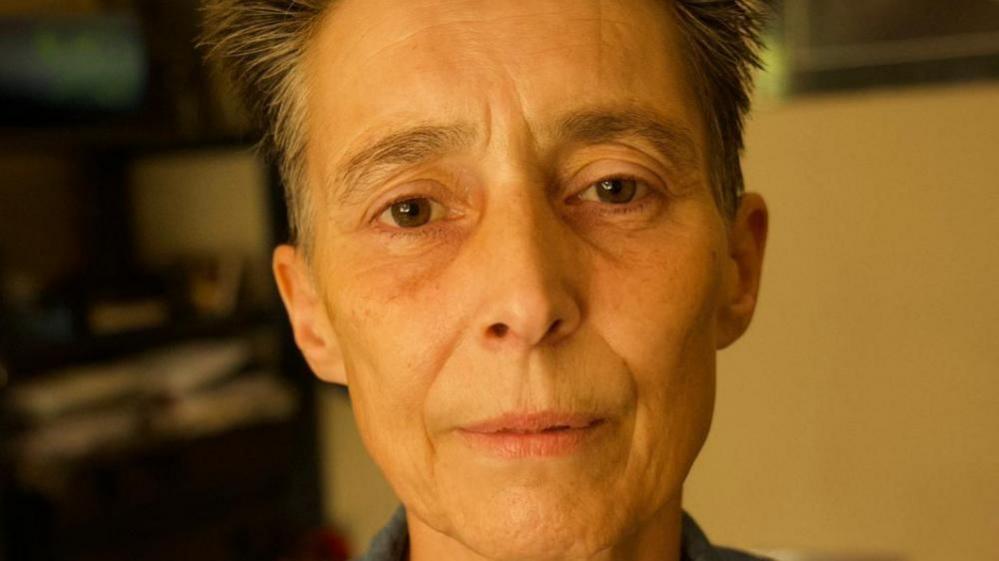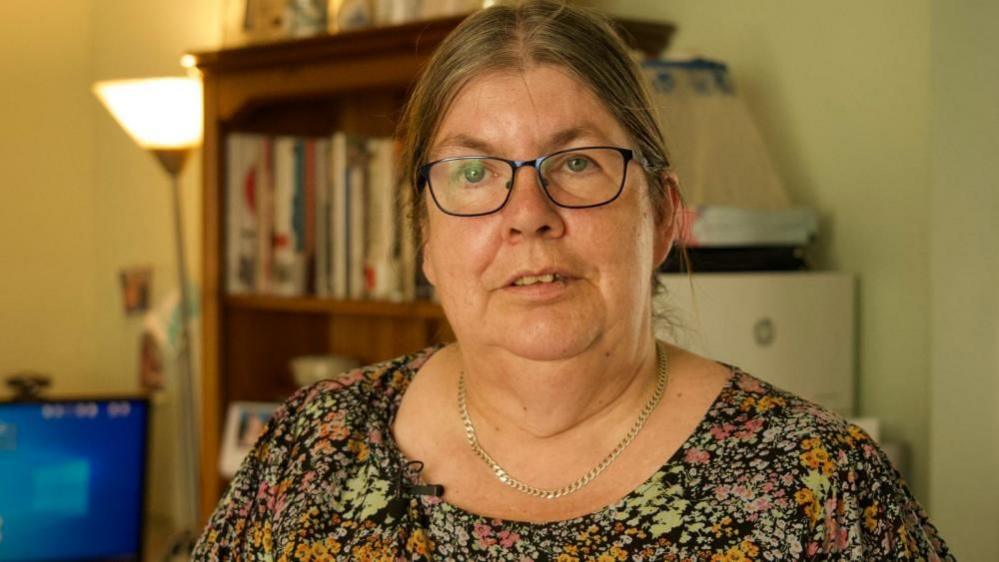rights
‘Just say sorry’, say forcibly adopted women
https://www.bbc.co.uk/news/articles/czdvg3y1jgeo
‘Just say sorry’, say forcibly adopted women

Fiona Irving & Jody Sabral
BBC News, South East
Cash Murphy
BBC News, South East
- Published14 July 2025
Two Kent women who were removed from their mothers when they were just weeks old and forcibly adopted say they need the government to formally apologise in order to help them recover from the trauma.
“Why can’t they just say sorry? They haven’t got the guts,” said Helen Weston from Yalding who was taken from her 15-year-old mother when she was 12 days old.
Nikki Paine, from Ashford, who was adopted at six weeks old, and was diagnosed with PTSD, says she just wants an acknowledgement of what happened to her.
A demonstration is due to take place on Wednesday to urge the government to apologise to the hundreds of people forcibly adopted during the 1950s, 1960s and 1970s as well as their mothers.
An inquiry by the human rights select committee, undertaken in 2021, looked at the experiences of children adopted across this period because their parents were either underage or not married.
Published in July 2022, its report recommended a formal apology after finding that babies were taken from mothers who did not want to let them go.
The Welsh and Scottish governments have officially apologised to those affected by forced adoptions, but the UK government so far has not.
‘Wracked with guilt’
Ms Weston said: “If we get the validation then maybe my birth mother won’t be so wracked with guilt and shame and keeping this dreadful secret.”
She was adopted in 1967 after her teenage mother was forced to give her up.
She says it has had a profound impact on her life and was diagnosed with complex PTSD.
“I’m not angry with anybody, I think that’s why I get so depressed,” she said.
“If there was one person I could be angry at, if one person was responsible, then I could give them a gob full and get rid of it.
“They genuinely thought they were doing the best for us.”

Ms Paine, who has also been diagnosed with complex PTSD, will be among those demonstrating in Westminster on Monday.
She said: “We’re all suffering from anxiety, we’re all on antidepressants.
“The apology would get the mental health support and that’s really important.”
She said: “We want this to be recognised because they took me away from my mother.
“I’m 63-years-old and it’s still affecting my life.”
‘I wanted my real mum’
Wednesday’s protest has been organised by adoptee advocate Zara Phillips, and is supported by the Movement for an Adoption Apology.
According to the group, between 1945 and 1976 an estimated 215,000 women had their children taken away from them.
A spokesperson for the group said: “We are all growing older and time is running out.
“We have been ignored by successive governments and now urgently need a public apology for this very personal and painful lifelong trauma.”
They said: “A public apology would help mothers and adoptees change the narrative around what was done to them.
“It would acknowledge the injustice and the loss which will endure for the rest of their lives.”
Some adoptees say they feel like they do not belong in their adoptive families especially when their adoptive parents have their own birth children.
Ms Weston said: “I was adopted into a family who had two children of their own, the dynamic with my adopted family was that I was always a problem child,” said Mrs Weston.
Ms Paine echoed this sentiment, saying: “I told my mother that she never hugged me, but she said you never wanted me to, and I thought how can you say that, but of course I wanted my real mum.”
The Department for Education has been approached for a comment.
New rights for UK donor babies as they turn 18
OCTOBER 3, 2023
New rights for UK donor babies as they turn 18
by Helen ROWE
Around 30 young adults conceived via sperm or egg donation in the UK will soon be able to discover the identity of their biological parent. The new rights come as rising numbers of children are being conceived using the technology, posing a range of challenges for the children, their families and donors. The UK law removed the anonymity of egg and sperm donors in 2005 and gave children the right to receive basic information about them when they reached 18. With the first children covered by the legislation turning 18 this month, they will finally be able to request details such as the donor’s full name, date of birth and last known address. Advances in fertility treatment methods and changing social attitudes have seen an increasing number of donor-conceived children being born not just to people facing fertility challenges but also same-sex couples and women in their late forties and even fifties. Initially the numbers of children who will have the right to know will be small, with just 30 people becoming eligible between now and December this year. Data from the UK’s Human Fertilization and Embryology Authority (HFEA) shows that will rise to more than 700 people by the end of 2024, increasing to 11,400 by 2030. According to the latest available figures from the regulator of fertility treatment and research using human embryos, 4,100 UK births around one in 170 were the result of donor conception in 2019.
Few months off
The cut-off point for the legislation has left some donor-conceived people disappointed that the identity of their donors will remain a mystery. “I’m happy for the people who want to find out but I’m also a little annoyed that I was a couple of months off, so I won’t have the chance,” 19-year-old student Jamie Ruddock, from Brighton on England’s south coast, told AFP.
Ruddock said he had known for as long as he could remember that he had been donor-conceived and while he was not looking for another father figure he was still curious. His older brother along with their father had begun looking for the donor via a DNA ancestry testing service but had not had any success. “My brother definitely has a bigger sense of curiosity than I do but if my brother finds him I would like to have a conversation with him,” he said.
People in the UK conceived by egg or sperm donation will now be able to trace their biological parents. Nina Barnsley, director of the UK’s Donor Conception Network, said many of those eligible to ask for the information might not even be aware of how they were conceived. When new techniques such as artificial insemination and in vitro fertilization (IVF) were first introduced some four decades ago, infertility was something of a taboo subject and parents often did not tell children how they were conceived. But for many years now, psychologists have advised families to be open with the information as early as possible. Others might not have realized the significance of the legislation or have other priorities.
‘Incredible gift’
“Certainly in terms of our donor-conceived young people, many have got far more important things going on in their lives with exams and girlfriends and boyfriends, travel and work and other challenges,” said Barnsley.
“Being donor-conceived may well just be low on the list of interests.”
Having the right to access the information, however, could still be important to them in the longer term, even if it also brought potential challenges. Some parents would inevitably be “anxious about making the donor into a real person in their lives and how their children would feel,” she said.
At the same time many were also “curious about these donors and wanted to thank them to acknowledge their contribution towards helping them make their families,” she added.
Donors are being urged to get in contact with the clinic where they donated and make sure their details are up to date. “This is a very important time for young adults who were conceived by the use of donor sperm or eggs. Many will hope to find out more about their donors as they reach 18,” said Professor Jackson Kirkman-Brown, chair of the Association for Reproductive and Clinical Scientists (ARCS).
He said it was important that donors too reach out for support and guidance to help them navigate any approaches. “Being a donor is an incredible gift and alongside the sector ARCS are keen to recognize and support those who enable people to have the families they desire,” he added.
![]()